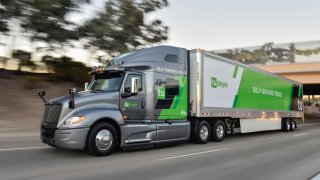
- TuSimple, a driverless tech company, tested its trucks by hauling fresh watermelons along a 951-mile route from Nogales, Arizona, to Oklahoma City.
- The job, which normally takes over 24 hours, took only 14 hours and six minutes, the company said.
- A human driver worked on the pick-up and delivery of the produce. But during the long middle segment of the drive -- from Tucson, Arizona, to Dallas, Texas -- TuSimple's vehicle drove itself with a human safety driver on board.
Autonomous vehicle company TuSimple on Wednesday claimed that its trucks shaved 10 hours off what's normally a 24-hour job.
The company tested its trucks by hauling fresh watermelons along a 951-mile route from Nogales, Arizona to Oklahoma City. The drive was part of a pilot project with TuSimple partners Giumarra, a produce grower and distributor, and the Associated Wholesale Grocers.
The run normally takes 24 hours and 6 minutes with human drivers and traditional trucks, but TuSimple's automated driving systems enabled a 42% faster run of 14 hours and six minutes, the company said.
Get San Diego local news, weather forecasts, sports and lifestyle stories to your inbox. Sign up for NBC San Diego newsletters.
According to TuSimple, a human driver worked on the pick-up and delivery of the produce. But during the long middle segment of the drive -- from Tucson, Arizona, to Dallas, Texas -- TuSimple's vehicle drove itself with a human safety driver on board.
A spokesperson for TuSimple told CNBC the pilot was done with a safety driver on-board partly to comply with a patchwork of local regulations in the U.S. TuSimple aims to operate its trucks without needing a safety driver on-board at all by the end of 2024. Its trucks can be driven manually if and when needed.
Money Report
Today, federal regulation does not limit the use of automated driving systems in the U.S. Rules and enforcement are left to states. But a congressional subcommittee on Tuesday discussed possible rules and incentives that would encourage broader adoption of driverless vehicles and grow the emerging industry domestically.
As an emerging tech company, TuSimple is not yet profitable despite its market cap of more than $7 billion. The approximately 800-employee startup spent $41.4 million on research and development in the first quarter this year, and generated $944,000 in revenue during the same period.
The company is going after a significant piece of an estimated $4 trillion global truck freight market.
Competitors developing autonomous vehicle systems specifically for hauling freight also include Aurora, Tesla via its Heavy Trucking unit, Daimler Trucks (via their Torc Robotics subsidiary), Amazon-backed Embark and Alphabet's Waymo, among others in the U.S.
Some competitors, joined by the likes of Toyota-backed Pony.ai and Nuro, are developing driverless vehicles for "contactless" food deliveries to consumers as well.
Prior to its IPO, TuSimple struck partnerships with and scored financial backing from Volkswagen AG's heavy-truck business, The Traton Group, and from Navistar to develop their vehicles. It also raised funds from the venture arm of UPS, and partnered with the U.S. Postal Service to conduct a multi-state test program running trucks between Dallas and Phoenix.






